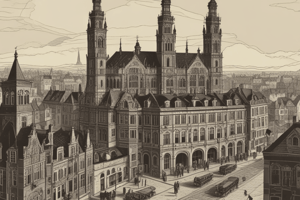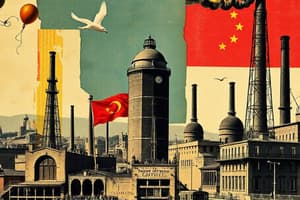Podcast
Questions and Answers
Which of the following movements led to the unification of Italy and Germany?
Which of the following movements led to the unification of Italy and Germany?
- Imperialism
- Capitalism
- Liberalism
- Nationalism (correct)
What was the primary driving force behind the Industrial Revolution?
What was the primary driving force behind the Industrial Revolution?
- Technological innovations (correct)
- Growing demand for individual rights
- Rise of nationalist movements
- Colonial expansion
Who was the French writer who advocated for social justice and human rights?
Who was the French writer who advocated for social justice and human rights?
- Otto von Bismarck
- Karl Marx
- Victor Hugo (correct)
- Napoleon Bonaparte
What was the outcome of the Berlin Conference?
What was the outcome of the Berlin Conference?
What was the primary cause of the growing divide between wealthy industrialists and working-class poor?
What was the primary cause of the growing divide between wealthy industrialists and working-class poor?
Which conflict led to the German unification and rise of Prussian power?
Which conflict led to the German unification and rise of Prussian power?
What was the primary characteristic of the Romanticism movement in art and literature?
What was the primary characteristic of the Romanticism movement in art and literature?
What was the wave of liberal and nationalist uprisings across Europe in 1848 known as?
What was the wave of liberal and nationalist uprisings across Europe in 1848 known as?
Flashcards are hidden until you start studying
Study Notes
Politics and Government
- Nationalism: Rise of nationalist movements across Europe, leading to unification of Italy and Germany
- Liberalism: Growing demand for individual rights and freedoms, influencing constitutional reforms
- Imperialism: European powers competing for colonial empires, leading to Scramble for Africa and conflicts
Economy and Industry
- Industrial Revolution: Transformation from agrarian to industrial society, driven by technological innovations and coal mining
- Capitalism: Emergence of capitalist systems, with growth of factories, trade, and banking
- Urbanization: Rapid growth of cities, leading to social and economic changes
Society and Culture
- Social Classes: Growing divide between wealthy industrialists and working-class poor, leading to social unrest
- Women's Rights: Early feminist movements, with demands for suffrage and equal rights
- Art and Literature: Flourishing of Romanticism, Realism, and Impressionism in art, literature, and music
Conflicts and Wars
- Napoleonic Wars: Series of conflicts following Napoleon's rise and fall, shaping European politics
- Crimean War: First modern war, fought between Russia and an alliance of France, Britain, and Ottoman Empire
- Franco-Prussian War: Conflict leading to German unification and rise of Prussian power
Key Figures
- Napoleon Bonaparte: French military leader and statesman, shaping European politics
- Otto von Bismarck: Prussian statesman, unifying Germany and dominating European politics
- Victor Hugo: French writer, advocating for social justice and human rights
Other Key Events
- Revolutions of 1848: Wave of liberal and nationalist uprisings across Europe, leading to reforms and changes
- Berlin Conference: International conference, establishing rules for European colonization of Africa
- Scramble for Africa: European powers competing for colonial territories in Africa, leading to conflicts and imperialism
Politics and Government
- Nationalist movements sweeping across Europe led to the unification of Italy and Germany
- Growing demand for individual rights and freedoms driven the development of liberalism, influencing constitutional reforms
- European powers competed for colonial empires, resulting in the Scramble for Africa and conflicts, exemplifying imperialism
Economy and Industry
- The Industrial Revolution transformed European society from agrarian to industrial, driven by technological innovations and coal mining
- The emergence of capitalist systems led to the growth of factories, trade, and banking
- Urbanization occurred rapidly, with cities growing exponentially, leading to significant social and economic changes
Society and Culture
- A growing divide between wealthy industrialists and working-class poor led to social unrest and the emergence of social classes
- Early feminist movements demanded suffrage and equal rights for women
- Romanticism, Realism, and Impressionism flourished in art, literature, and music, reflecting the cultural shifts of the time
Conflicts and Wars
- The Napoleonic Wars, a series of conflicts, shaped European politics following Napoleon's rise and fall
- The Crimean War, fought between Russia and an alliance of France, Britain, and the Ottoman Empire, was the first modern war
- The Franco-Prussian War led to German unification and the rise of Prussian power
Key Figures
- Napoleon Bonaparte, a French military leader and statesman, significantly shaped European politics
- Otto von Bismarck, a Prussian statesman, unified Germany and dominated European politics
- Victor Hugo, a French writer, advocated for social justice and human rights
Other Key Events
- The Revolutions of 1848 saw a wave of liberal and nationalist uprisings across Europe, leading to reforms and changes
- The Berlin Conference established rules for European colonization of Africa
- The Scramble for Africa resulted in European powers competing for colonial territories in Africa, driving imperialism and conflicts
Studying That Suits You
Use AI to generate personalized quizzes and flashcards to suit your learning preferences.




